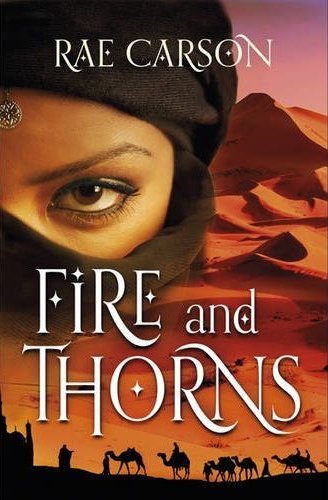From the day she was born, Lena has viewed the world through the jagged window of a razor-wired fence. The hundred-acre property she shares with her mother in the Australian outback may keep her safe from the Y-Carrier disease, but it is no longer enough to hold Lena’s interest, and her mother’s increasingly tight grip on her free will is stifling.I really enjoyed this book. The Australian setting was, of course, something I like to see and the story was fresh and different. Being a short book it was relatively fast-paced but didn't feel rushed at any point. Mostly the pacing meant that Lena didn't have much time to relax before the next disaster/major event (except for at the very end, but I'll get to that).
Just as her curiosity blooms and her courage rises, she meets a boy through the fence — the first boy she has ever laid eyes on. His name is Patrick and he comes with a dangerous yet irresistible invitation of adventure beyond the fence, an invitation to which Lena cannot say no.
But Lena’s newfound freedom is short-lived and she soon discovers that the Y-Carrier disease is not the only enemy she faces on the outside. Her new enemies want something Lena has, and they are willing to do anything to get it...
Lena has spent her whole life living on a fenced-off property with her mum. Her family fled to the desert after/during an epidemic struck Australia (and it helped that Perth had the warning of the East Coast going first, in terms of getting away prepared and while it was still relatively safe). The disease, Y-Carrier, infects both men and women, but infected men only develop a permanent rash, while women die a rapid and painful death. Predictably, there aren't many women left around, and those that are are highly sought after by, well, all the men in different ways. Out in the desert seventeen years after the disease first struck, Lena and her mother still fear men who might be Carriers (and, particularly in the case of Lena's Mum whose more aware of these things, they fear violet gang rapes like a couple that happened off the page before the story begins). Although the text doesn't explore the issue in great detail, I found the new-era gender politics it did touch upon interesting; in a world of mostly men women are both very vulnerable and very powerful.
When Lena first meets a boy she is fascinated by him because she has literally never met anyone other than her mother and her now-deceased father and cousin Alice. Usually insta-love in YA is irritating, but in this case it's more insta-fascination (on Lena's part anyway) and didn't really bother me until the very end (although even then I still think it made sense).
Sick of being cooped up with her mother, when Lena finally leaves her adventures end up being not quite what she (or I) expected. It's always nice to be surprised by books that don't quite fit the existing mould. I don't want to go into too much detail on this because spoilers, but I will say that as well as some of the events in the middle being not quite as predicted, the ending is very un-Hollywood. (Well, unless you define Hollywood as "full of special effects", then perhaps we can call it non-traditional.) This is the second non-US-authored YA book I've read recently where the ending was bittersweet. I can see some readers being disappointed by the ending for this reason — and also possibly because some weird stuff happens during the climax, but that at least was definitely foreshadowed — but for me it worked and felt more "right" than any of the obvious alternatives.
As I said, I enjoyed Carrier a lot. It was the first book I read this year that made me excited enough while reading to give it five stars. It's self-contained, but I certainly wouldn't object to reading more in this world, perhaps a book set several years down the line when some children we meet in Carrier would be teenagers. Either way, I highly recommend Carrier to fans of YA post-apocalyptic/dystopian fiction. Carrier isn't dystopian (there aren't enough people around for any concrete flavour of civilisation, let alone any sort of government), but I know that the two sub-genres have a lot of cross-appeal. I would particularly recommend it to readers looking for a slightly different take on the post-apocalyptic narrative.
5 / 5 stars
 First published: March 2014, Escape Publishing (Harlequin AU)
First published: March 2014, Escape Publishing (Harlequin AU)
Series: Don't think so but wouldn't object if it were.
Format read: eARC
Source: Publisher via NetGalley
Challenges: Australian Women Writers Challenge, Australian Science Fiction Reading Challenge



 This review was originally posted
This review was originally posted